October 19, 2006
Administrators discuss students' Internet use
CARBONDALE, Ill. -- Asking rhetorically, "Are we the Internet police?" attorney Shane L. Aldridge told a roomful of school administrators concerned about cyber misbehavior, "There is no hard and fast law that governs students' use of the Internet on their own time."
His afternoon presentation was just one of several during the daylong School Administrators' Legal Roundtable put on by Southern Illinois University Carbondale at its Student Center Oct. 11.
The roundtable, now in its 10th year, brings together school superintendents, principals and lawyers to discuss areas of concern. This year's workshop included sessions on such subjects as tenure, evaluation and seniority; collective bargaining; homeless students; disciplinary measures and civil rights for both students and staff; and an update on the Freedom of Information Act and the Open Meetings Act.
Aldridge, a graduate of the SIU School of Law and former middle school special education teacher, now works as an associate in the Springfield office of Hodges, Loizzi, Eisenhammer, Rodick & Kohn. The firm, which also has offices in Arlington Heights and Belleville, represents school districts, educational institutions and local government agencies.
The Internet has become a new kind of playground, Aldridge said, with old-style behavior.
"It's pretty much the same thing we have seen for a number of years — teasing, name-calling, 'you're not my friend' — but research has found that its anonymity has allowed bullies to take these things to the extreme," he said.
Citing newspaper accounts of cyber snipers in West Chicago and Franklin County, Aldridge said, "No section of the country is immune."
School administrators who think they won't have problems because they control their computer access could be surprised.
"These days everyone has a cell phone," Aldridge pointed out.
"All the digital technology that's out there can be used to bully our students."
And bully they do.
Citing recent research, Aldridge said, "Half of our students say they have experienced some form of online bullying, and the other half say they have participated in it."
Instead of dying down after awhile, cyber taunting seems to take on a life of its own, going on and on and on with devastating effects. Students fear leaving home, ask to be transferred, sometimes kill themselves.
Merely blocking access to a nasty site won't solve the problem.
"These kids are too smart," Aldridge said.
"I don't know what we can do technologically to stay ahead of them."
Lacking any established legal precedent, school district administrators will have to feel their way, Aldridge said. But they should not necessarily rely on "acceptable use" computer policies written back when schools first put the first clunky predecessors of today's fast, do-everything models on their students' desks.
Aldridge thinks administrators must tie their computer policies into their discipline codes.
"School districts have the right to regulate the use of their equipment when it becomes disruptive to the learning process," he said.
"School districts will have to develop some kind of workable system as to how to handle this, although you won't have anything that is air tight. There will be a gray area. I think your best frontline protection is going to be supervision of your students when they're in school."
Shaping cooperative ventures is among the goals of Southern at 150: Building Excellence Through Commitment, the blueprint the University is following as it approaches its 150th anniversary in 2019.
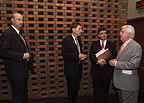
Time out — During a break
in Southern Illinois
University Carbondale’s
annual legal roundtable
for school administrators
Oct. 11, Steve Webb (left),
superintendent of Goreville
Community Unit School
District, chats with (from
left) luncheon speaker and
Illinois State Board of
Education Superintendent
Randy Dunn, SIUC educationa
l administration and higher
education department
chairman Brad Colwell, and
keynote speaker Paul
Houston, executive director
of the American Association
of School Administrators.
Download Photo Here
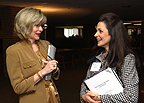
Discussion session — Teri
Coscarelli (left),
superintendent of Vienna
Community Unit School District
No. 55, and Angela Farmer,
assistant superintendent of
Massac County Community Unit
School District No. 1, talk
over proceedings at the 10th
annual School Administrators’
Legal Roundtable held Oct.
11 at the Southern Illinois
University Carbondale Student
Center. Download Photo Here
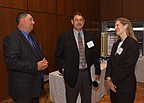
Legal ease — Greg Goins
(left) superintendent of
Thompsonville School
District No. 62, and Ernest
Crain, superintendent of
Jonesboro Community Consolidated
District No. 43, learn more
about educational law from
Margaret Hesse, a lawyer from
Edwardsville, during Southern
Illinois University
Carbondale’s annual legal
roundtable for school
administrators Oct. 11.
Download Photo Here
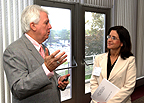
More to say — Paul Houston,
executive director of the
American Association of
School Administrators in
Arlington, Va., talks with
Ruth Schneider, superintendent
of Stewardson-Strasburg
Community Unit School
District No. 5A, after he
delivered the keynote
address at Southern
Illinois University
Carbondale’s annual legal
roundtable for school
administrators Oct. 11.
Download Photo Here
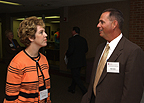
Catching up — Andria Murrah
(left), principal and
curriculum director at Johnston
City Community Unit School
District No. 1, reminisces
with Mark Collins,
superintendent of Herrin
Community Unit School District
No. 4, about the old days when
both taught science in Herrin.
The two attended Southern
Illinois University
Carbondale’s annual legal
roundtable for school
administrators. Download
Photo Here
